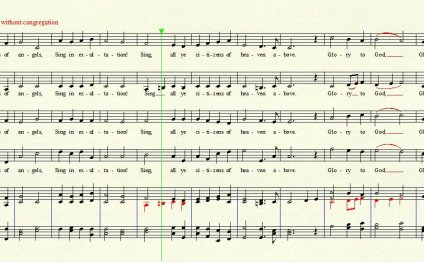
O Come All Ye Faithful Choir
Welcome to The 12 Days of Christmas Songs: an attempt to uncover the forgotten history of some of the most memorable festive tunes. From December 14 through 25, we’ll be tackling one secular song and one holy song each day.
adore is a curious word. In English, it’s become a cutesy toss-off, best used around baby chicks (“Adoooorable!”) or under-$50 Christmas presents (“Oh, I just adore Yankee Christmas Candles!”). It denotes obsession, but in a sugar-high kind of way—a burst of intense affection that doesn’t necessarily reach the depths of the soul.
The 12 Days of Christmas Songs
But the word comes from a serious root: the Latin, adorare, to speak or pray. It is a worship word, one of prostration that lifts the eyes up rather than turning them to the ground. And it is the central idea of “O Come All Ye Faithful.” Oh, come, let us adore him: a straightforward call to prayer, urging everyone to drop what they’re doing and gather round, for “born the king of angels.”
It’s slightly disorienting to hear this exhortation in present-day, though. With its contemporary connotations, Adore feels more like a descriptor of Jesus’s baby-ness than his divinity-ness. Babies are undeniably awesome, but Jesus is supposed to be awe-some; his general-variety cooing is not quite what Christmas is about.
That’s why composition is everything. I tend to find contemporary Christmas music baffling, if not outright terrible; give me the boys’ choirs and magisterial organ-playing, please. For “O Come All Ye Faithful, ” I always get a little tingly listening to this version, by the famous choir of King’s College, Cambridge:
Listening to this, there’s no mistaking adore as a synonym for squeal with glee; it is an expansive adore, enough to reach the rafters of a towering Gothic chapel. This seems like the best beyond-aesthetic justification for turning up one’s nose at the Faith Hills and Elvises and Weezers of the world: In remixing the archness of the traditional version, they lose a little of its existential grandness. Yes, even Weezer:
To be sure, their version is catchy. But it lacks the gravity of earlier renditions, first known to be published in 1751. Sometimes, the sweetness of adoration can obscure the heft of the act, one that can be such an important part of human life. Adoration: the joyful, wondrous experience of humans in relation to God.
YOU MIGHT ALSO LIKE



Share this Post
Related posts
Show Choir dresses for sales
EVAN CAIN, Account Manager Carmel High School, Ambassadors I think my favorite memory from show choir was the last time our…
Read MoreChurch Choir Devotions
On Saturday, September 13, 2014, new and returning members of the National Lutheran Choir gathered for their first rehearsal…
Read More










